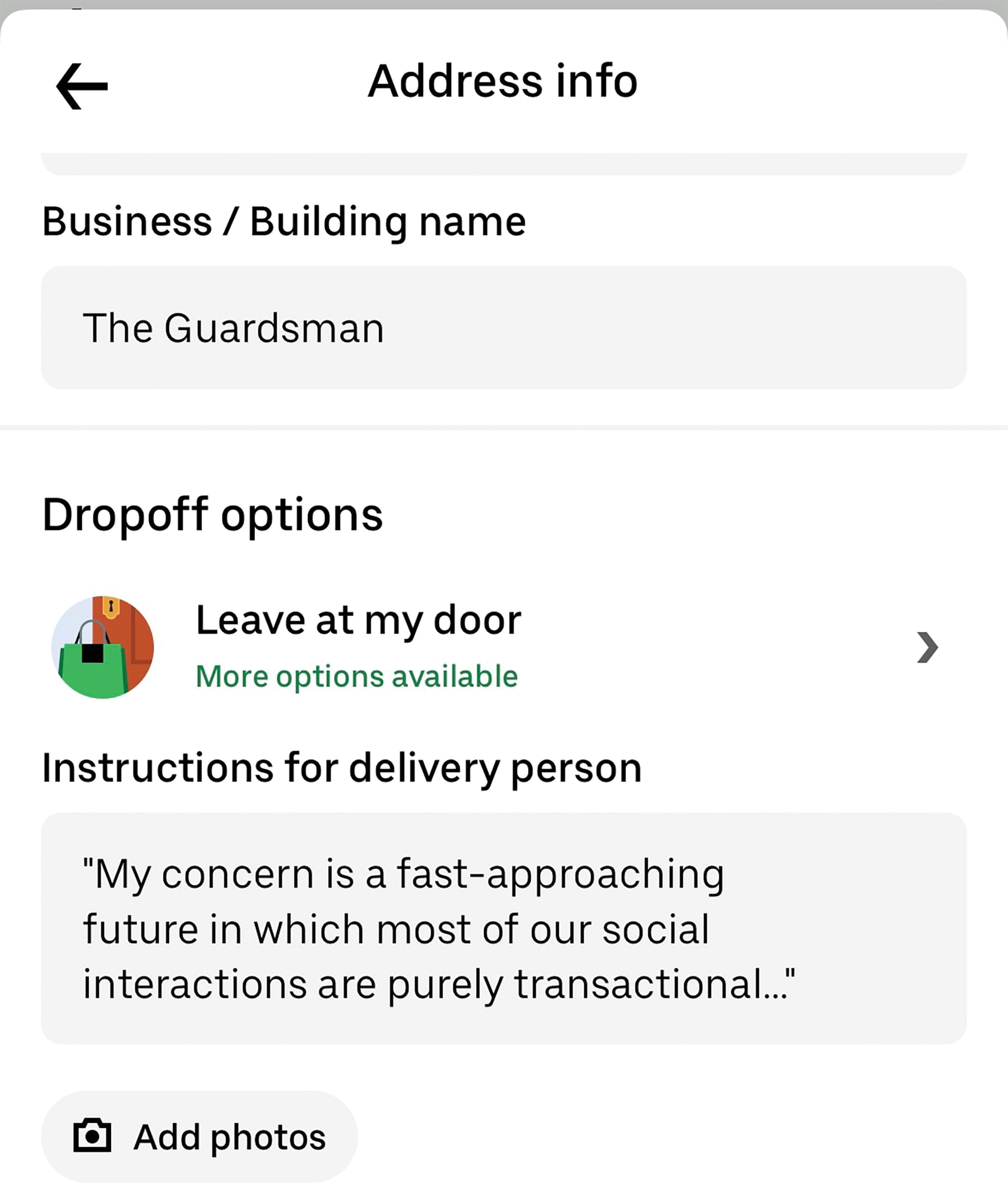Delivery Apps Are Contributing to Our Loneliness Epidemic
Services like Amazon Fresh and DoorDash contribute to an environment of near instantaneous demand satisfaction devoid of the pesky social interactions typically involved with a trip to the grocery store or local restaurant. By the time you open your front door to grab that bag of C & H Pure Cane Gra


By Abby Sigler
There were two viral social media moments related to delivery apps earlier this year, representative of a growing sentiment: maybe it's time we go back to doing our own shopping. One post was a screenshot of a New York Times report circulating on X, which detailed a Hollywood director’s delayed evacuation from the L.A. fires as he awaited his $300 Amazon Fresh delivery. I hope he tipped, at least.
The other was a TikTok posted by a woman whose five-item DoorDash grocery order had been bungled, with four of the five not at all matching her instructions. For example, she had received the Ultimate Caesar Salad Kit rather than the Chopped Caesar she had requested. I have no hope at all that she tipped.
Services like Amazon Fresh and DoorDash contribute to an environment of near instantaneous demand satisfaction devoid of the pesky social interactions typically involved with a trip to the grocery store or local restaurant. While baking cookies, an unexpected sugar shortage at home is solved with a tap and a surcharge of a few dollars. No need to turn off the preheating oven because Instacart promises delivery within the hour. By the time you open your front door to grab that bag of C & H Pure Cane Granulated White Sugar, you might just catch a glimpse of the individual who fulfilled your request hustling back to their car to complete another order. The convenience is unparalleled, but at what cost?
Wielded as a replacement for in-person tasks, these apps contribute to a disintegration of community engagement. By paying a company to send someone out on our behalf, we bypass the opportunity to build a relationship with that remarkably cheerful cashier lady or request that occasional cup of sugar from our neighbors. These conventions are only as old-fashioned as we allow them to be. As our nation is suffering from a loneliness epidemic, it might behoove us to seek out minor social connections wherever we can get them.
This is not to say that the concept of meal or grocery delivery is inherently immoral or socially corrosive. Some argue that these services are vital to people with disabilities and the elderly. Not everyone has the privilege of a grocery store within walking distance or a body that can get them there. This feels like a bad-faith response, especially in the face of the Hollywood director situation, but I’ll give them the benefit of the doubt.
Still, are these ill-conceived “move fast and break things” Big Tech disruptors the best solution? Have we given up on the community’s role in taking care of each other? My concern is a fast-approaching future in which most of our social interactions are purely transactional– or worse, replaced entirely as we get sucked ever deeper into the tiny screens that know us so well. Although I feel the temptation of that convenience-seeking mindset, I refuse to believe it is worth abandoning our already fraying community ties.
I still remember the moment I officially became a regular at my local coffee shop, the look of recognition passing over the barista’s face like “Ah, her again!”. Our quick exchanges are simultaneously inconsequential and sustaining, well worth the chilly morning walks to and from.
Next time your fridge is empty, consider going to the grocery store and resisting the gravitational pull of the self-checkout machine. Have a nice chat with your cashier, and bask in the delightful awkwardness of small talk with a stranger.



